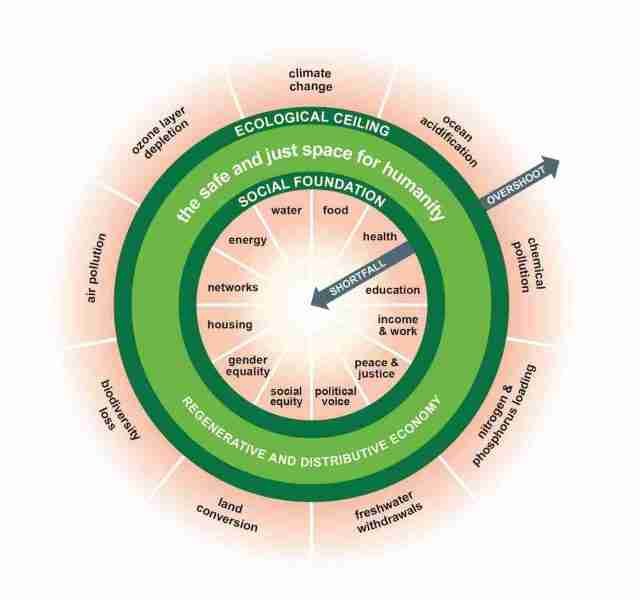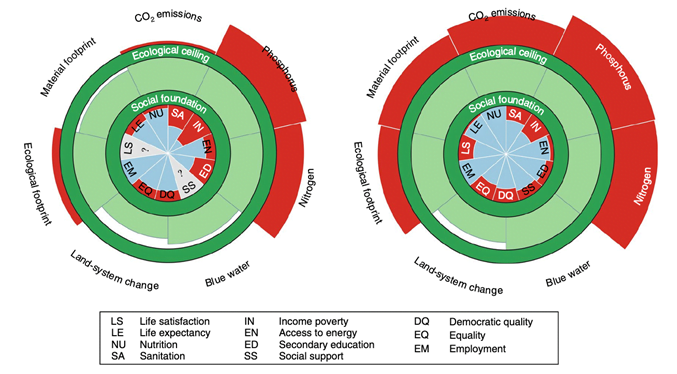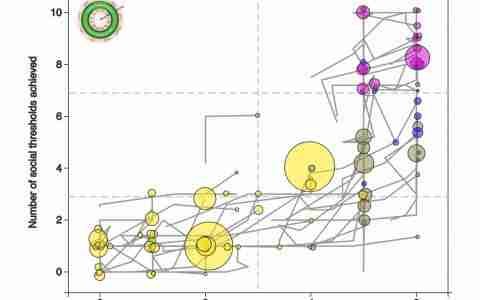Why We Do What We Do
We must find a way to change tracks.
We are now dealing with a global convergence of challenges: inequality, climate breakdown, injustice, ecological collapse, pollution, recurring financial crises, hunger, corruption, pandemics, kleptocracy, racism and conflict.
Despite progress in many areas, humanity as a whole is still failing to meaningfully address these challenges.
Thriving Communities is therefore on a mission to help communities to break through today’s challenges and create radical enough change to come to thrive in the 21st century.
By ‘thriving’ we mean that communities attain high levels of wellbeing for everyone, while getting back to living within the ecological and physical limits of their local environment and Planet Earth. In this we are guided by Kate Raworth’s holistic ‘doughnut’ model of sustainable development:

A recent study by Leeds University, against the doughnut model, shows that all countries remain on a path that is driving ecological breakdown, while delivering slow and insufficient improvements in living standards for citizens. This is shown in the snapshot below comparing the global picture between 1992 and 2015.

The following image shows the trajectory of a number of countries over the same period, none of which are on a path towards the top-left corner, which is the safe and just place we need to be in.

This analysis reinforces how human societies still remain far from enabling everyone to live well, without breaking the planetary systems that we depend on.
While the climate is only one of the planetary systems we depend on, it is rightly at the forefront of work to create the sort of changes that we need to make. The International Panel on Climate Change have made it very clear that humanity is almost out of time to properly shift onto a path of rapid decarbonisation, and that fitting through the small window to avoid the worst impacts of climate change requires “rapid, far-reaching and unprecedented changes in all aspects of society.”
The crises facing us have been clear and escalating for some time, but our collective response has been insufficient. Rather than rapid, far-reaching and unprecedented change; what we are managing is still too slow, too incremental and too narrow to really address our systemic problems, and their underlying drivers.
This adds up to a chronic failure that is undermining people’s quality of life today and our children’s future.
We must change course.
We believe that our overall failure stems from structural problems in how communities are working to create change and progress.
We essentially know what we need to do. We need clean energy and mobility systems. We need healthy and comfortable homes and public spaces. We need effective and transparent governments and governance. We need regenerative local food production. We need economic structures like taxes, money and banking that work everyone not just a few people. We need circular material flows through our economies. We need meaningful work for all, with time left to enjoy life with friends and family.
None of these things are unachievable and we are not short of technical solutions to make them real.
If we know what we should do, but we have not yet done it, then clearly our problem is how to break through the social barriers that continue to inhibit us in making the progress we need. We must find better ways forward, and fast.
So, Thriving Communities focusses on the core problem of how communities can organise, resource, plan and manage radical enough processes of change so that everyone can genuinely come to live and thrive within planetary boundaries.
This is what guides Our Approach and the work of Our Collective.
Primarily we mean communities-of-a-place aligned to a geography such as a neighbourhood, village, city, region, or even a country. We are deliberately flexible and open to working at different, and multiple, community scales. The important thing is staying grounded in real action and benefits to real people in the places where they live, work and play.
Within such local geographic communities there will always be a range of actors playing their important parts in community life, including citizens, non-profit organisations, social enterprises, local government, academic institutions, social and sporting clubs, healthcare providers, utility companies, other public institutions and businesses of different sizes. We believe that working with communities means working with all actors in connected and meaningful ways and that this will also require new models for organising and collaborating locally.
We note that people also identify with networked communities that are more bound together by common ideas. While in theory we could apply our approach to working with such idea-based communities, it is not our main focus. We prioritise working with place-based communities.
